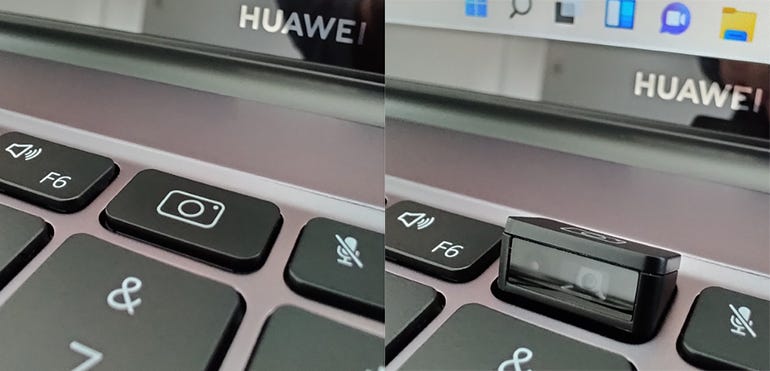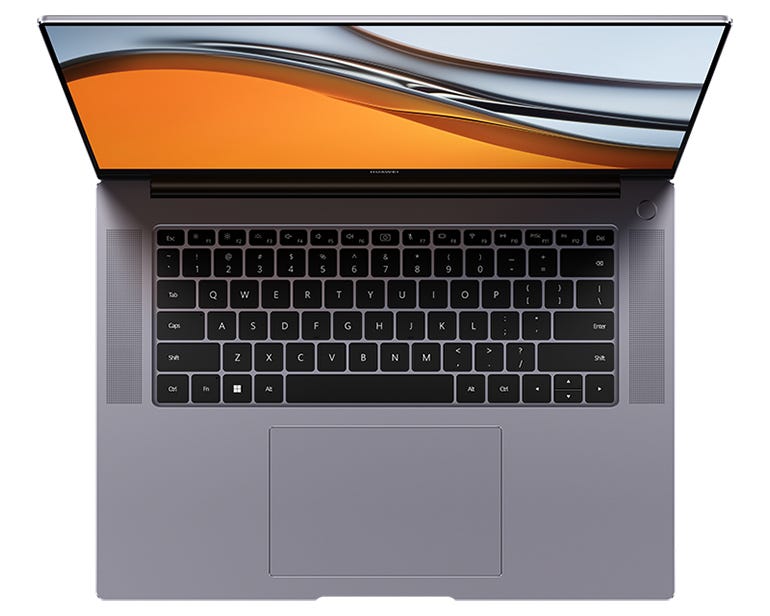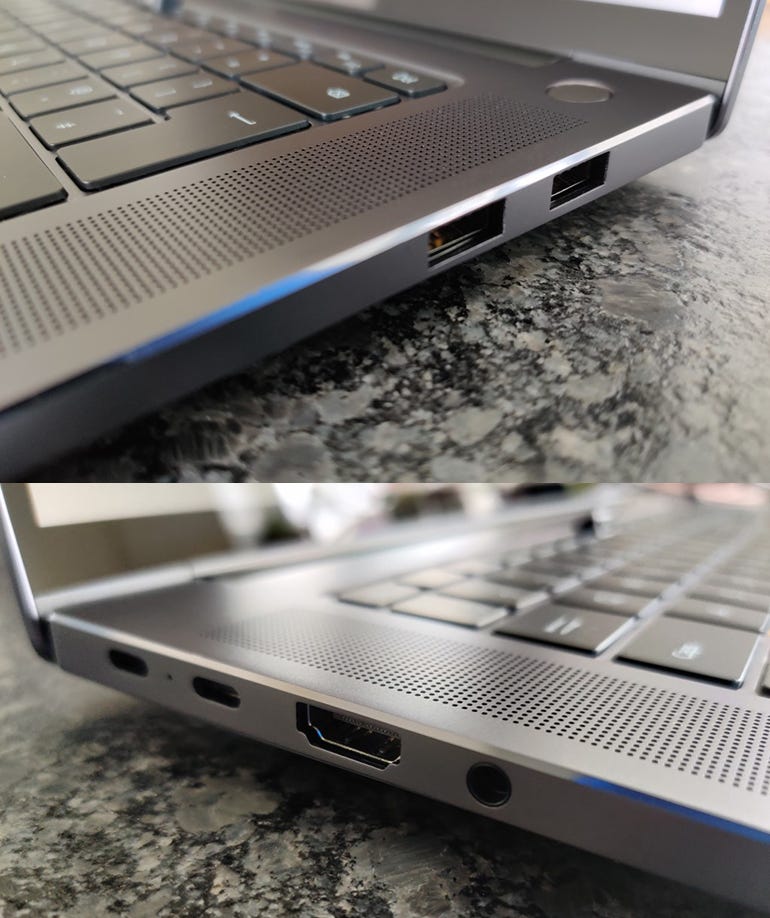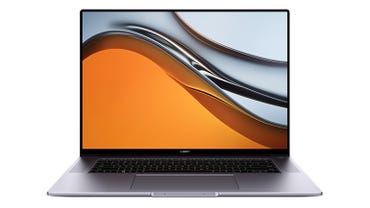Huawei MateBook 16 review: Powerful and well priced, but the webcam is a problem | ZDNet
Large-screen laptops can be heavy and awkward to carry, but the benefits of a 16-inch display for both productivity and entertainment use cases are alluring. Huawei’s MateBook 16 majors on its high-quality screen and solid internals, based on an AMD Ryzen 7 processor with integrated Radeon Graphics, 16GB of RAM and a 512GB SSD (the same platform as the recently reviewed MateStation X all-in-one PC).
In the UK this configuration costs £999.99 (inc. VAT), a deal that’s considerably sweetened by a ‘free gift’ in the shape of a Huawei MateView GT 27-inch monitor worth £229.99. In France you’ll pay €1,199.99 with a free Huawei BT Mouse II worth €59.99 thrown in, while Germany charges €999 and bundles a Huawei Sound Joy speaker worth €129 (in green) or €99 (in black). The MateBook 16 is not currently available in the US; the UK price translates to around $1,300.
All this is very tempting, but does the MateBook 16 succeed in its primary purpose of being a powerful large-screen laptop?
Like
- High-quality 16-inch IPS screen
- Good all-round performance
- Good speakers
- Long battery life
- Attractive price
Don’t Like
- Webcam location and resolution need a rethink
- Reflective screen
- Screen mirroring and file sharing limited to Huawei devices
Huawei has a good track record when it comes to laptop design and build, and the MateBook 16 is, for the most part, no exception. The chassis colour is Space Grey, which is a little darker than many greys and lends a bit of distinction to the laptop’s clean, minimalist lines.
The aluminium used for both lid and base provides plenty of protection for the insides when the laptop is in a bag or backpack. There are no formal ruggedness credentials in the shape of ML-STD certification or an IP rating, though. At 1.99kg the MateBook 16 is quite a weight, and it’s a bulky carry too, measuring 351mm wide by 254.9mm deep by 17.8mm thick. The power supply adds a minimal amount as it comprises just a small mains plug and a long USB-C to USB-C cable.
The chassis houses a 16-inch IPS panel with 3:2 aspect ratio that consumes most of the area available to it. Huawei quotes a screen to body ratio of 90%; the top and side bezels are shallow (I measured them at 6mm to the very edge of the lid), while the bottom bezel is a little deeper. The 3:2 aspect ratio provides a bit more height for viewing spreadsheet rows or documents, and I found it comfortable to work with two documents open side by side. On the other hand, some videos will letterbox quite noticeably.
The screen’s 2.5K (2520 x 1680 pixels, 189ppi) resolution delivers sharp text and images, although the screen is very reflective, which can be distracting in some situations. The display’s maximum brightness of 300 nits is fine for normal indoor working, but may be an issue in brightly-lit environments or outdoors. Huawei claims 100% coverage of the sRGB colour gamut, but there’s no mention of the wider DCI-P3 gamut that’s widely used in video editing.
There are speaker grilles either side of the keyboard, and these output sound towards the user very efficiently. Audio quality is well rounded, with a good amount of bass.
We noted that the bezel above the screen is narrow, and that’s because Huawei persists with its somewhat eccentric webcam location: the camera is hidden under a key in the middle of the Fn row, and pops up when you press it.

As on several previous MateBook models, the webcam — a basic 720p unit — pops up when you press the relevant key in the Fn row. As many reviewers have noted, this results in an unflattering camera angle on video calls.
Images: Sandra Vogel / ZDNet
I’ve commented before about how awkward this is — in last year’s review of the Matebook D 15, for example. Trying it again here for a couple of work calls confirmed my view that this simply isn’t a viable location for a webcam: nobody deserves to look up their interlocutor’s nose while on a call, and it’s a hassle to raise the laptop on stand or a pile of books just for video calls. Huawei really does need to rethink this arrangement (and indeed has done on the 2022 MateBook X Pro).

The MateBook 16’s keyboard is flanked by speaker grilles, which rules out a separate number pad. The power button in the top right corner incorporates a fingerprint reader. Note the generous-sized glass touchpad.
Image: Huawei
The keyboard is comfortable to use: the double-height Enter key is easy to find, and there are full-size left and right arrow keys, plus a row of relatively large Fn keys. There is a dull, hollow ‘thunk’ as keys are depressed, which is less irritating to others in the room than a more ‘clacky’ response. Biometric authentication is via a fingerprint sensor built into the power button in the top right corner, above the speaker grille.
The glass touchpad is huge and nicely responsive. It might look a bit disproportionate, but I find larger touchpads much easier to work with than smaller ones.
Huawei MateBook 16 specifications
|
OS |
Windows 11 Home |
|
Dimensions (WDH) |
351mm x 254.9mm x 17.8mm |
|
Weight |
1.99kg |
|
Processor |
AMD Ryzen 7 5800H Mobile Processor |
|
Graphics |
AMD Radeon Graphics |
|
RAM |
16GB (DDR4 Dual Channel) |
|
Storage |
512GB (NVMe PCIe SSD) |
|
Display size |
16 inches |
|
– type |
IPS |
|
– Resolution |
2.5K (2520 x 1680, 189ppi) |
|
– Aspect ratio |
3:2 |
|
– Refresh rate |
60Hz |
|
– Viewing angles |
178° |
|
– Screen-to-body ratio |
90% |
|
– Colours |
1.07 billion (10-bit colour) |
|
– Colour gamut |
100% sRGB |
|
– Colour accuracy |
average △E=1 |
|
– Brightness |
300 nits |
|
– Contrast ratio |
1500:1 |
|
– Touch screen |
no |
|
Battery |
84Wh Li-polymer |
|
Connectivity |
Bluetooth 5.0, Wi-Fi 5 (802.11ac) |
|
Ports |
2x USB-C (DisplayPort, Power Delivery), 2x USB-A (USB 3.2 Gen 1), HDMI, 3.5mm audio in/out |
|
Audio |
dual mics, stereo speakers |
|
Camera |
720p (pop-up from keyboard) |
|
In the box |
MateBook 16, 90W USB-C power adapter, quick-start guide, warranty card |
|
Price |
£999 (UK), €1,199.99 (France), €999 (Germany) |
There’s just one Huawei MateBook 16 configuration available in the UK, based on an AMD Ryzen 7 5800H Mobile Processor with integrated AMD Radeon Graphics, 16GB of DDR4 RAM and a 512GB NVMe PCIe SSD. Elsewhere in Europe, there’s an alternative model based on the Ryzen 5 5600H processor. My Ryzen 7-based review configuration handled an everyday mix of productivity and after-hours entertainment workloads with no trouble at all.
Huawei is fairly generous with connections on the MateBook 16. Alongside a pair of USB-C ports, one of which is needed for charging, there are two USB-A ports, a full-size HDMI connector and a 3.5mm audio in/out jack. I’d like an SD card reader as well, but it’s good to see a laptop accommodating users with older equipment that they’d like to link to their laptop. There’s no USB 4 or Thunderbolt support here, though.

MateBook 16 ports: 2x USB-A (top); 2x USB-C, HDMI, 3.5mm audio in/out (above). One of the USB-C ports is used for charging.
Images: Sandra Vogel / ZDNet
Huawei includes a couple of features designed to benefit owners of other Huawei devices. The PC Manager app, which is called up via a Fn key combination, allows you to set up multi-screen collaboration and use Huawei Share.
Screen sharing lets you use a Huawei tablet or phone as a second screen in either mirror, extend or collaborate mode — the latter allows files to be dragged between tablet and laptop. It is a smart idea, but it only works with some other Huawei devices and some Honor devices from the time when the two brands were conjoined — the list is here. That link also explains the various file types and devices that are supported by Huawei Share, another file sharing service that’s limited to Huawei and Honor devices.
Huawei also includes a Performance Mode, which is toggled with the Fn and P key combo. The idea is you can get more out of the laptop when you need it, but when you want to extend battery life you can dial performance down. Performance Mode is only available under mains power, so my battery life test was carried out in standard mode.
Long battery life is not guaranteed in 16-inch laptops, but the Huawei MateBook 16 delivers here thanks to an 84Wh battery. In a typical three-hour work session using web apps and streaming some music the battery dropped just 26%, suggesting total battery life of around 11.5 hours.
Conclusions
Well made, with long battery life and an excellent 16-inch screen, Huawei’s MateBook 16 ticks a lot of boxes. The speakers impress and the keyboard is easy to work with, making this a good all-rounder for both work and after-hours duties. The price is attractive too, especially with Huawei’s giveaways.
But even with all these positive points, the position of the 720p webcam is a huge issue. If Huawei were to reposition this, and also upgrade the resolution, it could have a real winner on its hands. As it is, anyone who needs to do regular video calling for work or for leisure should probably look elsewhere, or rely on an external camera.
Alternatives to consider
There is now a wide range of 16-inch laptops available, at price points starting below $1000. Here’s a selection, starting with Dell’s well-priced Inspiron 16 Plus, taking in convertible (HP) and workstation-class (Asus) devices, both with OLED screens, and topping out, price-wise, with the Apple Silicon-based 16-inch MacBook Pro.
RECENT AND RELATED CONTENT
Apple 16-inch MacBook Pro (M1 Max, late 2021) review: Apple supercharges its flagship laptop
HP Spectre x360 16 (2021) review: A high-quality 16-inch convertible with a superb OLED screen
Dell Inspiron 16 Plus 7610 review: A solid, attractive and well-priced 16-inch laptop
Asus ProArt Studiobook 16 OLED (H5600) review: A top-quality 16-inch mobile workstation for creative pros
The best laptops: Does Apple take the crown?
Read more reviews
For all the latest Technology News Click Here
For the latest news and updates, follow us on Google News.

